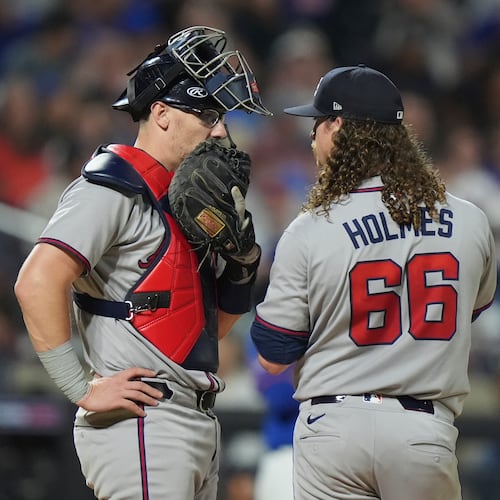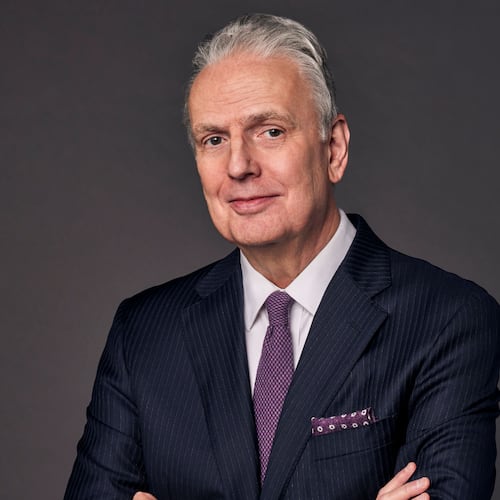Editor’s note: Nov. 2 is the three-year anniversary of the Braves clinching the 2021 World Series championship with a Game 6 win over the Astros in Houston. The AJC looks back on that moment in Braves history.
They were champs of the only division they could have won. They held the worst record among 12 playoff qualifiers. Of the 28 Braves teams to grace postseason – counting prior manifestations in Milwaukee and Boston – theirs was the second-worst winning percentage.
As of July 30, 2021, the Braves had the 19th-best record among 30 MLB clubs. It marked the first time under general manager Alex Anthopoulos they’d underperformed. They’d won the National League East three years running. They’d led the Dodgers 3-1 in the 2020 National League Championship Series. Over the offseason, they signed Charlie Morton, who’d helped Tampa Bay to the World Series, and re-upped Marcell Ozuna, who’d led the NL in homers and RBIs.
They seemed primed. They went nowhere.
Their opening-day outfielders: Ozuna in left; Cristian Pache, rated MLB’s No. 7 prospect by Baseball America, in center; and Ronald Acuña Jr., the game’s brightest young star, in right. After hitting .111 over 22 games, Pache was sent to Triple-A Gwinnett. Ozuna suffered two broken fingers in May; four days later, he was arrested on charges of domestic violence. Acuña tore his ACL on July 10, the day before the All-Star break.
Oh, and pitcher Michael Soroka, expected back in late summer after rehab of a torn Achilles, re-tore his Achilles in late June. In July, yours truly typed a missive that began: “When it’s not your year, it’s not your year.”
On July 15, the Braves traded for outfielder Joc Pederson. On the morning of July 30, they were third in the East, five games behind the first-place Mets. They acquired three more outfielders that day. One became MVP of the NLCS; another was MVP of the World Series.
Said Freddie Freeman on the night he became a world champ for the first time: “A whole new outfield.”
Said Anthopoulos, who missed the coronation in Houston after testing positive for COVID-19: “We needed a lot of players.”
Not until mid-August did the Braves nose above .500 to stay. The new outfielders – besides Pederson, they were Adam Duvall, Eddie Rosario and Jorge Soler – made a difference. From Aug. 2 through the regular season’s end, the Braves went 36-18. It was enough to win a bad division. Nobody believed it would be enough to last long in October.
The Braves won 88 games. The Brewers, their Division Series opponent, won 95. The Dodgers won 106 – and finished as a wild card, the Giants winning 107. Cold numbers and common sense told us, “No chance.” What none among us noticed was that the stars, ever so gently, had begun to align over Cobb County.
The Brewers entered the postseason in gear-down mode, having lost 11 of 15 games. They managed six runs over 36 NLDS innings. After winning the opener 2-1, they didn’t score again until the fourth inning of Game 4. Max Fried worked six scoreless innings in the massive Game 2; Ian Anderson went five scoreless in Game 3. Pederson homered in Games 1 and 3.
Game 4 came down to one of those October moments: Freeman, fearsome hitter, against Josh Hader, fearsome pitcher; score tied, two out in the eighth. No left-handed hitter had homered off Hader, a lefty, that season. His first pitch was a slider. Freeman sent it over the wall in left-center.
Seated upstairs, the guy who’d proclaimed it Not Their Year was in revision mode. He wrote: “The Braves got hot when they needed to get hot, and they’ll face the Dodgers or the Giants in the next round riding the lightning. They believe they can beat anyone. They may well be right.”
That same night, the Dodgers beat the Giants to even their best-of-five. Two nights later, Cody Bellinger singled in the ninth to send L.A. to the NLCS – which would begin and end at Truist Park. Of everything that broke right that fall, that might have been the biggest breaker.
Rather than fly cross-country to San Francisco, the Braves stayed home awaiting the 106-win Dodgers, who’d spent their starting pitchers in the NLDS. They went with a bullpen starter in Game 1. They almost got away with it, but Austin Riley drove home Ozzie Albies, who’d singled and stolen second, for a walk-off win. The losing pitcher that night: Blake Treinen, currently one of the toasts of Tinseltown.
L.A. went with a real starter the next night. Given a 2-0 lead after a half-inning, Max Scherzer held it only until the fourth, when Pederson, a sensation not just for his hitting but also for his stylistic sense, hit a two-run homer to tie it. The wearer of pearls changed yet another game. His new team was about to change doubters into believers.
The Dodgers pulled ahead 4-2 in the seventh. Dave Roberts, the L.A. manager, deployed starter Julio Urias in the eighth on two days’ rest. What worked in Game 7 of the previous NLCS didn’t work again.
The Braves tied it off Urias. Rosario started the rally and scored on what he deemed “a great slide.” (Rosario’s press briefings that month were classic.)
The Braves’ Will Smith worked a clean ninth, striking out the Dodgers’ Will Smith, who’d homered off his namesake in the pivotal Game 5 a year earlier. With two outs in the bottom of the inning, Rosario faced Kenley Jansen with Dansby Swanson on second.
Rosario scorched a grounder to the right of second base. Shortstop Corey Seager could have gloved it without moving. He whiffed. It was scored a single, but it remains in my mind the error that released the whirlwind.
From Ben Ingram on Braves radio: “This is unbelievable!”
And it was. These Braves were doing as so many of their predecessors couldn’t do: They were playing out of their minds in the crucible of October. They were moving so fast they made the other guys look ponderous. Said Rosario: “When I saw Seager in the middle, I went ‘oh.’ Then he missed the ball.”
There’d be six more victories and dozens of dauntless deeds – Rosario’s homer in the NLCS clincher; three World Series blasts by Soler, coming off COVID; Anderson’s five no-hit innings; Fried’s six scoreless in the clincher; Tyler Matzek every blessed night – but for me the moment of truth came when Rosario hit a ball that might have been fielded but wasn’t. The Braves had no more fear of the team that ousted them in October 2013, 2018 and 2020. They were up 2-0 and flying.
They answered two losses in L.A. with victories in which they never trailed. They did the same after Houston’s two World Series wins. A team that was nothing special over six months was, for 15 games in October plus one in November, the absolute best.
On the night of Nov. 2 in Houston – by then, it was Nov. 3 in Atlanta – I asked manager Brian Snitker at what moment he went from hope to belief. He pointed to the walk-offs versus L.A. He said: “It’s like, ‘You know what? I think we can pull this off.’”
It took a while, but when finally the 2021 Braves got going, they weren’t stopping until somebody handed them a trophy. They rode the lightning. They gave us the ride of our lives.
THE REST OF THE STORY
Holy bleeping bleep: https://www.ajc.com/sports/atlanta-braves/some-home-runs-you-feel-forever-holy-bleeping-bleep/7FNTXX6UZVB7JFDBSPKXMOESII/
Return to Houston: https://www.ajc.com/sports/atlanta-braves/brian-snitker-on-return-to-houston-the-last-time-i-was-here-it-was-a-pretty-good-time/LG5WSSQNCZAY5NEYGPLQL6MY2A/
About the Author
Keep Reading
The Latest
Featured



